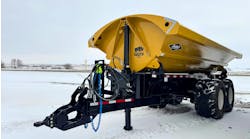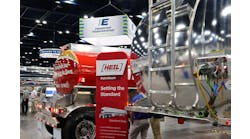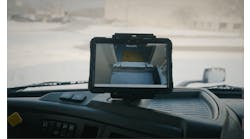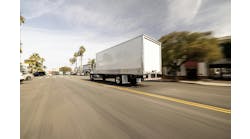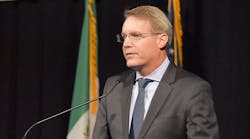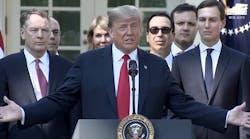COLORADO SPRINGS, CO. In a timely appearance Thursday, American Trucking Associations President and CEO Chris Spear provided a hot take on breaking policy initiatives regarding trade and vehicle autonomy, and he also emphasized the importance—in this period of prosperity for trucking and transportation equipment suppliers—of seizing the moment to take action to protect the industry.
Speaking at the annual meeting of the National Trailer Dealers Association, Spear said he was “very encouraged” by the trade agreement with Canada reached earlier this week, with Mexico already on board, to extend the trilateral NAFTA pact that began in 1994. He cited the statistics, noting that Canada is the largest trading partner of the US, and that 71% of border crossings with Canada occur by truck, along with 82% of those crossings with Mexico. All told, trucks account for 76% of NAFTA surface freight.
“Nothing between these nations happens without our industry making it happen,” Spear said. “We are the catalyst for growth, and we would be the first to feel the pain that would come from withdrawal or major changes to the previous agreement.”
But questions remain with regard to tariffs on aluminum and steel, he was quick to note. Spear suggested that the new trade agreements would lead to the elimination of tariffs in the North American market, but that tariffs would continue to be applied to trade with Europe and with China.
“This is how this administration conducts its negotiations. It’s different. It’s a little bit more caustic, with certainly a lot more rhetoric—but we are seeing results. We are seeing agreements,” he said. “These discussions, these tactics are working—so we’re encouraged. Once agreements are reached, tariffs will be eliminated and we’ll get on with business. These agreements create certainty, and our entire supply chain depends on that.”
Also Thursday, Spear took to the stage just a couple of hours after the US Department of Transportation released new federal guidance for automated vehicles, dubbed AV 3.0.
Since taking the reins at ATA two years ago, Spear has emphasized the importation of trucking having a voice in the development of autonomous vehicle policy, and he restated that position here.
“We’re 4% of vehicles on the road, but we’re moving 71% of the domestic freight, and we pay half the tab into the Highway Trust Fund,” he said. “We have every reason to be part of this debate, and not concede it to our colleagues in the auto industry. We’re not going to inherit a regulatory framework that we had no part in designing.”
AV 3.0, and the federal rulemaking procedure, provides “ample opportunity” for the trucking industry to comment, Spear noted. He explained that the framework is not a mandate, and it encourages innovation. He also pointed out that the development of autonomous vehicle technology does not mean “driverless” technology. Instead, he referred to “driver assist” technology, and said that such innovation “can solve a lot of problems,” including improved safety and operational performance.
“These types of technologies would apply differently for short haul and regional versus long haul, certainly differently for LTL and truckload,” Spear said. “Technology will be applied and adopted as it fits business models, and the new guidance announced today speaks to that. We’re very encouraged by the direction the administration is taking on this, and we are very pleased to be at the table.”
Similarly, Spear noted that the ATA board in May voted to oppose any side underride guard mandate. Legislation currently under consideration would require side guards for new as well as existing trailers—with a price tag of more than $10 billion, by Spear’s “conservative” estimate.
But tests show limited effectiveness, he added. Most importantly, that effectiveness is based on the assumption that a car has hit the trailer. He explained the importance of vehicle connectivity and the need for the FCC to allocate the 5.9 GHz band to drive the development of driver-assist safety systems.
“I kind of like technology that prevents the accident from happening,” Spear said.
The big picture
ATA’s policy agenda includes initiatives to support an increase in the federal gas and diesel tax for highway infrastructure projects, to reform hours of service, to develop training programs that would allow drivers 18-21 years old to move freight across state lines, and to reestablish federal precedence where state work laws are being applied to interstate truckers. And, he argued, the time to push a pro-trucking agenda is now.
“This is the best economic performance in the United States in 20 years for trucking. That’s good for everybody in this room because carriers are buying more of your equipment,” Spear said. “I couldn’t imagine a better environment than what we’re seeing right now.”
The positive environment provides an opportunity, Spear emphasized.
“Not an opportunity to sit back and enjoy, but an opportunity to look five, 10, 15 years out and understand where our industry needs to be,” he said. “This is the time to take corrective action on issues, legislation, regulation, and on a number of state initiatives that impede interstate commerce.”
Finding little relief in the courts or in Congress, ATA recently filed a petition calling on the Secretary of Transportation to preempt the imposition of state laws on interstate truckers, using authority granted by federal safety codes. The petition has been posted for public comment.
“It is my belief we will get a favorable decision this year,” Spear said. “We will fix this problem. We don’t roll over; we don’t go away. If we don’t get what we want on Capitol Hill, we’ll find another way to do it. This is our last shot, but I’m very confident we’ll win this issue and send a message to the folks in California: Don’t mess with trucking.”
